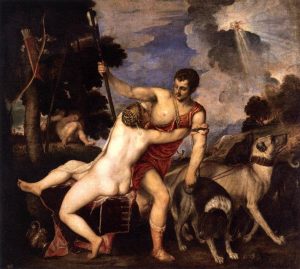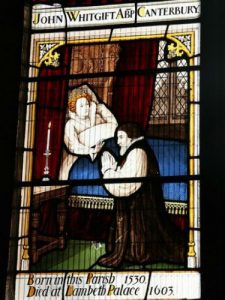Long as the craftie Cuttle lieth sure
In the black Cloud of his thick vomiture;
Who list complain of wronged faith or fame
When he may shift it on to another’s name.
Authorship doubt began in Shakespeare’s lifetime. Orthodox scholars will tell you that there was no doubt about Shakespeare’s authorship until the 1850s, as the depressingly prosaic nature of the historical record connected to Shakespeare became apparent and fell short of the notion of the lone genius author developed by the Romantic poets. Non-Stratfordians, however, will tell you that doubt began in the sixteenth century, connected to the very first publications to appear under the name ‘William Shakespeare’.
 The first of these was the long poem Venus and Adonis, registered anonymously in April 1593 and on the bookstalls by June. Though there was no name on the title page, it contained an authorial dedication to the Earl of Southampton signed ‘William Shakespeare’. Orthodox biographies will tell you that William Shakespeare was well established as an author by this time, but the historical record says otherwise. As far as we can tell, the name was unknown to the general public before it appeared on Venus and Adonis. Though we have evidence that Titus Andronicus and early versions of Henry VI Parts 2 and 3 had already been staged (they would be published the following year), and scholars believe a number of other canonical plays were already in existence, the audiences would have had less idea of the playwright’s name than we have of the screenwriter’s name when we go to see a movie (which we at least have a chance of noticing, since a movie has credits). There is no evidence that the name William Shakespeare had appeared in any literary or theatrical context before it appeared on this dedication in 1593.
The first of these was the long poem Venus and Adonis, registered anonymously in April 1593 and on the bookstalls by June. Though there was no name on the title page, it contained an authorial dedication to the Earl of Southampton signed ‘William Shakespeare’. Orthodox biographies will tell you that William Shakespeare was well established as an author by this time, but the historical record says otherwise. As far as we can tell, the name was unknown to the general public before it appeared on Venus and Adonis. Though we have evidence that Titus Andronicus and early versions of Henry VI Parts 2 and 3 had already been staged (they would be published the following year), and scholars believe a number of other canonical plays were already in existence, the audiences would have had less idea of the playwright’s name than we have of the screenwriter’s name when we go to see a movie (which we at least have a chance of noticing, since a movie has credits). There is no evidence that the name William Shakespeare had appeared in any literary or theatrical context before it appeared on this dedication in 1593.
 Venus and Adonis was a sensation, and became the most widely printed work in Shakespeare’s lifetime. It went through seventeen editions before 1641, and provoked much admiration from other writers. The next year it was followed by a similar long poem, The Rape of Lucrece. Doubts about these poems’ authorship were raised, according to non-Stratfordians, in Joseph Hall’s Vergidemiarum (1597-8) and John Marston’s The Metamorphosis of Pygmalion’s Image (1598), both satires. We are fortunate to possess copies of these texts, since within two years of their publication, they became the first two items listed in the Bishops’ Ban of 1599. Nine books were specifically singled out for destruction. Scholars disagree about what properties these nine books have in common to cause official offence, but the first two listed share an interest in an author they call ‘Labeo’.
Venus and Adonis was a sensation, and became the most widely printed work in Shakespeare’s lifetime. It went through seventeen editions before 1641, and provoked much admiration from other writers. The next year it was followed by a similar long poem, The Rape of Lucrece. Doubts about these poems’ authorship were raised, according to non-Stratfordians, in Joseph Hall’s Vergidemiarum (1597-8) and John Marston’s The Metamorphosis of Pygmalion’s Image (1598), both satires. We are fortunate to possess copies of these texts, since within two years of their publication, they became the first two items listed in the Bishops’ Ban of 1599. Nine books were specifically singled out for destruction. Scholars disagree about what properties these nine books have in common to cause official offence, but the first two listed share an interest in an author they call ‘Labeo’.
There is evidence that ‘Labeo’ was their name for the author of Venus and Adonis, and that Joseph Hall was the first person to publicly question Shakespeare’s authorship. So what is this evidence, and does it withstand scrutiny?
Read the first section, and continue through chapter by using the links at the bottom of each post. Sections are summarised below.
- Who is the ‘Crafty Cuttle’?Marston and Hall appear to believe that Shakespeare’s Venus and Adonis and The Rape of Lucrece were written under a pseudonym: Labeo.
- Shakespeare’s But, O, and Hyphenated AdjectivesShakespeare’s first two poems use the hyphenated adjectives that Hall criticises, and also ‘big But Ohs’, assisting his identification as Labeo. But there’s more.
- Shakespeare, Phoebus and PetrarchShakespeare’s identification as Hall’s ‘Labeo’ is strengthened by his stealing from Petrarch in Rape of Lucrece, and appealing to Apollo in Venus and Adonis.
- Shakespeare as Poggies GhostHall’s Labeo is referred to as a ‘bawdy Poggies ghost’. What does Hall mean by this, and how does it link to Shakespeare?
- Lynceus the Boar-HunterJohn Marston appears to refer to Joseph Hall as Lynceus, the mythical boar-hunter. How does this help us identify Hall and Marston’s target?
- Bacon and Mediocria FirmaWhen John Marston used the phrase ‘medocria firma’ – the Bacon family motto – was he suggesting that ‘Labeo’ was Francis Bacon?
- The Original LabeoWhy the nickname Labeo? A look at three possible derivations of Hall’s nickname for the author we know as Shakespeare.
- The Case for Sixteenth Century Doubt of Shakespeare’s AuthorshipA summary of the argument that Marston and Hall doubted Shakespeare’s authorship. This powerful combination of evidential points has not been successfully refuted.
Click Here to Subscribe and we’ll notify you about new content.